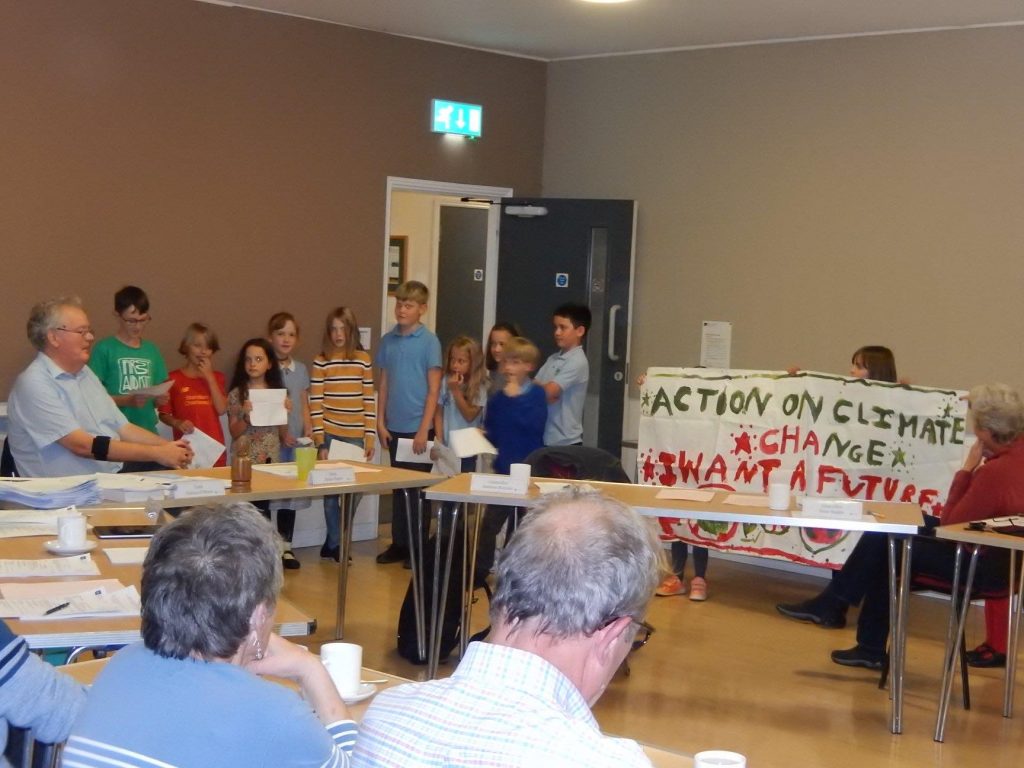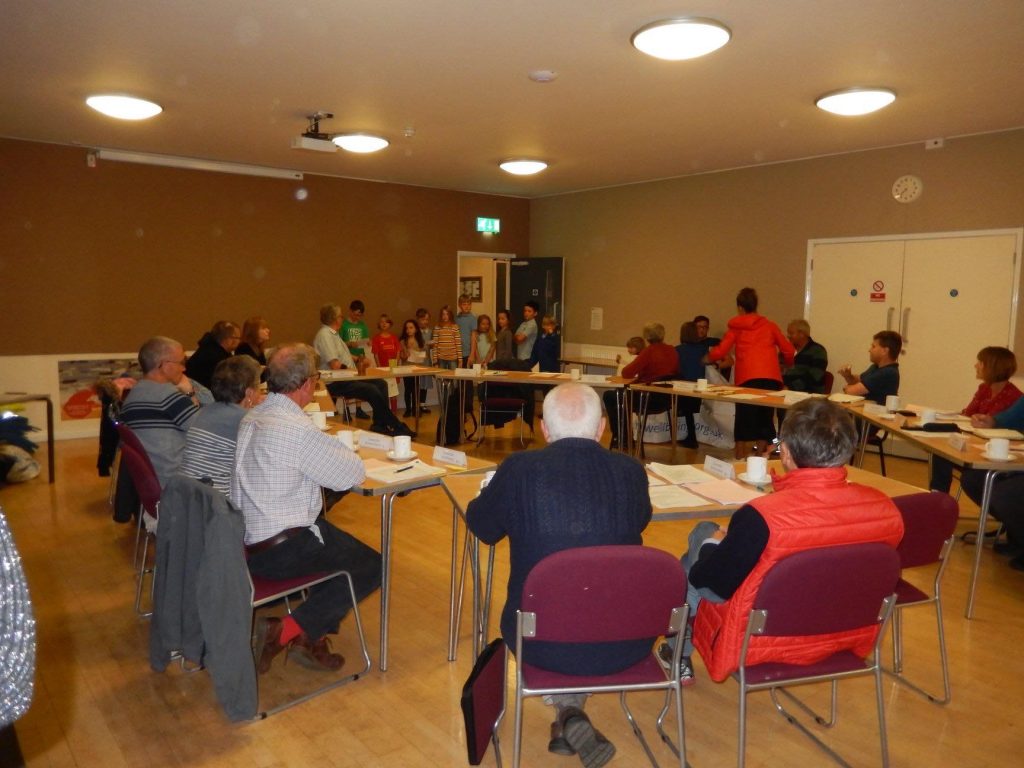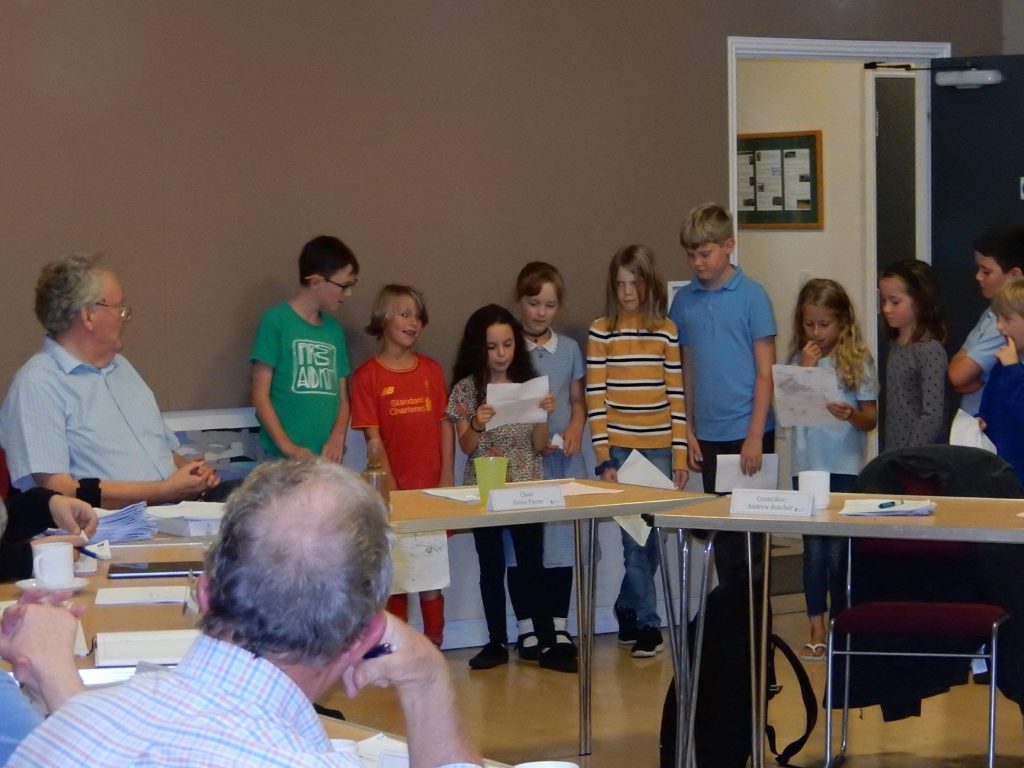By Simon Beard and Pippa Heylings
By all accounts, the last meeting of Histon and Impington Parish Council was like no other. Not only was the hall packed with members of the public, but the evening’s business had to be re-scheduled to allow many of them to go home for bed-time. The Histon and Impington Youth Eco Council had come out in force (with their parents) to ask the parish council to declare a climate emergency for our village. This called on the council to set a target of making itself carbon neutral by 2021 and playing a leading role in helping the whole community transition to net zero as quickly as possible.

The children asked their council to do this for many reasons: because climate change was their future, because they loved the place they lived and wanted to see it looked after, and because they looked to the responsible adults in their community to lead in bringing about change. Adults who also spoke up at the meeting stressed the value of community efforts to go green, for instance by planting trees and making sure homes are well insulated. They also highlighted the opportunities now available for councils wanting to do more to tackle climate change, from advice and support to local and national grants, like South Cambridgeshire’s new Zero Carbon Communities Grant.

We are proud to live in a village that was the first in Cambridgeshire to take such a step. However, we would be even more proud if other communities were to commit to working together for change. Here’s why.
One of us (Simon) is the Academic Programme Director at the University of Cambridge’s Centre for the Study of Existential Risk, where we study the dangers of climate change and other global risks. One point that is beyond doubt is that Cambridgeshire is likely to bear the full brunt of such change and that this is already underway. Our region is water-stressed, having some of the lowest rainfall levels and highest temperatures in the country. This may just mean rising prices and the threat of water shortages to local residents and businesses. However, to our many farming communities, the increasing need to irrigate crops and the possibility that this might become impossible are risks to their very way of life. On the other hand, Cambridgeshire is also going to be one of the worst affected regions of the UK by rising sea levels, with large areas currently at elevated flood risk and many more to follow. Between droughts and floods, we should not let the optimistic picture painted by advocates for our area’s growth agenda fool us into neglecting the very real risks facing us.

The other one (Pippa) is both a councillor for South Cambridgeshire District Council and the founder-director of Talking Transformation, a specialist advisory service that works around the world to facilitate transformative change towards zero carbon and environmental sustainability. Key to this facilitation process is multi-stakeholder dialogue, where diverse groups get together to make collective decisions about their environment. This is a process that goes beyond the idea that government knows best by bringing local communities, environmental experts, political representatives and others together to share their knowledge, ambitions and concerns. Right now in Cambridgeshire, we are in the grip of one of the most centrally planned economic and social transitions in UK history, with the biggest ever city deal and a powerful regional mayor pushing for change across our county. Although there is some talk of sustainable development, it is clear that economic growth is the primary goal of this process. How can our elected representatives speak up for our local communities in such a process without hearing from the parish councils and other community groups that are closest to them , and how can they speak loudest except by adopting a clear and common voice to declare the climate emergency that we all face and our collective desire to respond to it.
So, what will declaring a climate emergency actually achieve?
One clear and vital goal is to position local communities as leaders in transition, rather than roadblocks to it. Already we have seen zero carbon transition plans passed by Cambridge and Peterborough City Councils, South Cambridgeshire District Council and Cambridgeshire County Council (Pippa is responsible for leading the implementation of the plan at South Cams). However, these could be even more ambitious if councillors saw their local communities and parish councils as ambitious allies, inspiring and leading them to do even more. On top of this, parish councils, as consultees on planning applications, can influence the planning system, which is one of the main drivers of our communities future emissions.
A second key point is that by taking an active role in the zero-carbon transition, parish councils can make this a process that works for local communities themselves. The process of transition can create many changes that people want to see, from more accessible green spaces and less local congestion to electric vehicle charging points and water fountains. Similarly, local communities are in the best position to understand issues like traffic flows and local service needs, and by actively leading the zero carbon transition, we can ensure that these are better met in future. Doing this will not only benefit our communities directly, it also has a vital role to play in promoting trust and fairness across policy’s being designed by other levels of government, including nationally. Without this trust, such policies are harder to implement and less likely to succeed, making parish councils a vital partner for everyone in this crucial area.
Finally, parish councils can play a leading role in the community and can be an agent of change by themselves. Councils and councillors are often the leaders of a host of communal activities and initiatives, from looking after our shared spaces to organising community events. Some councils have gone even further, by coordinating collective utility purchase schemes, carpooling or social care. While the job of a councillor can seem like an endless stream of thankless committee meetings, the fact is what people see are super active community members, who are seen and heard at the heart of the community. As such, councillors have a real voice to inspire change in unexpected places, a form of soft power that, in the real world, often exceeds their statutory authority several times over.
For decades now, environmentalists have been asking people to think global and act local, and that has never been more important than today. In Cambridgeshire, we have a real opportunity to put this idea into action by asking our parishes to step up, declare a climate emergency and start working to transition our communities towards a sustainable future.
